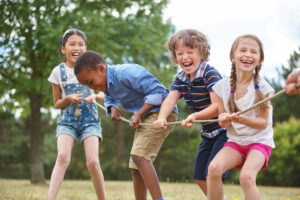The transition from school to home is a crucial part of the day for middle schoolers. Establishing a structured after-school routine can help your child decompress, stay organized, and manage…
Building Social Skills Over the Summer

Summer is an excellent time to work on social skills with your neurodiverse child. Without the pressures of school, you can create low-stress opportunities for social interaction and skill development. This post offers a variety of strategies and activities to help your child build social skills during the summer months.
Structured Playdates
- Small Groups: Start with small, manageable playdates to prevent overwhelming your child. Invite one or two children for short, structured play sessions. Gradually increase the group size and duration as your child becomes more comfortable.
- Set Expectations: Clearly outline the activities and expectations beforehand. Use visual schedules and social stories to explain the sequence of events and appropriate behaviors. This can help reduce anxiety and set your child up for success.
- Supervised Interaction: Stay nearby to supervise and facilitate interactions. Offer gentle guidance and support as needed, but allow your child to take the lead in their social interactions.
- Shared Interests: Plan activities that align with your child’s interests and strengths. Shared interests can create a natural foundation for social interaction and help build connections with peers.
Community Programs
- Social Skills Groups: Many communities offer social skills groups for children with neurodiversity. These groups provide structured opportunities to practice social skills in a supportive environment. Look for programs led by trained professionals who understand the unique needs of neurodiverse children.
- Camps and Clubs: Look for camps and clubs that cater to children with special needs. These programs often provide a range of activities designed to promote social interaction and skill development. Choose programs with a low staff-to-child ratio and a focus on individualized support.
- Volunteer Opportunities: Explore volunteer opportunities that allow your child to give back to the community while practicing social skills. Activities like helping at a local animal shelter, participating in community clean-up events, or assisting at a library can provide valuable social experiences.
Role-Playing and Practice
- Role-Playing Scenarios: Practice common social scenarios at home through role-playing. Examples include greeting others, sharing, taking turns, and handling conflicts. Use toys, puppets, or role-reversal to make the practice engaging and fun.
- Reinforce Positive Behavior: Use positive reinforcement to encourage good social interactions. Praise specific behaviors, such as making eye contact, using polite language, or waiting patiently. Consider using a reward system, such as a sticker chart, to track and celebrate progress.
- Video Modeling: Video modeling involves watching videos of appropriate social interactions and then practicing those behaviors. Create your own videos or use pre-made ones available online. This visual and auditory approach can be particularly effective for neurodiverse children.
Utilize Technology
- Social Skills Apps: There are various apps designed to help children with neurodiversity develop social skills. These apps often use interactive games and scenarios to teach concepts like empathy, communication, and problem-solving. Explore options that match your child’s interests and learning style.
- Virtual Playdates: Use video calls to connect with friends and family in a controlled environment. Virtual playdates can be a low-pressure way for your child to practice social skills and stay connected with others. Plan activities such as online games, virtual storytime, or show-and-tell sessions.
- Online Communities: Join online communities and forums for parents of neurodiverse children. These platforms can provide valuable support, resources, and ideas for social skill-building activities. Connecting with other parents can also help you find local playgroups and events.
Building social skills over the summer can be both fun and productive. By creating supportive environments, using targeted strategies, and incorporating your child’s interests, you can help them develop valuable social skills. Remember to be patient and celebrate small successes along the way. Be sure to check out our other summer posts here and here.
